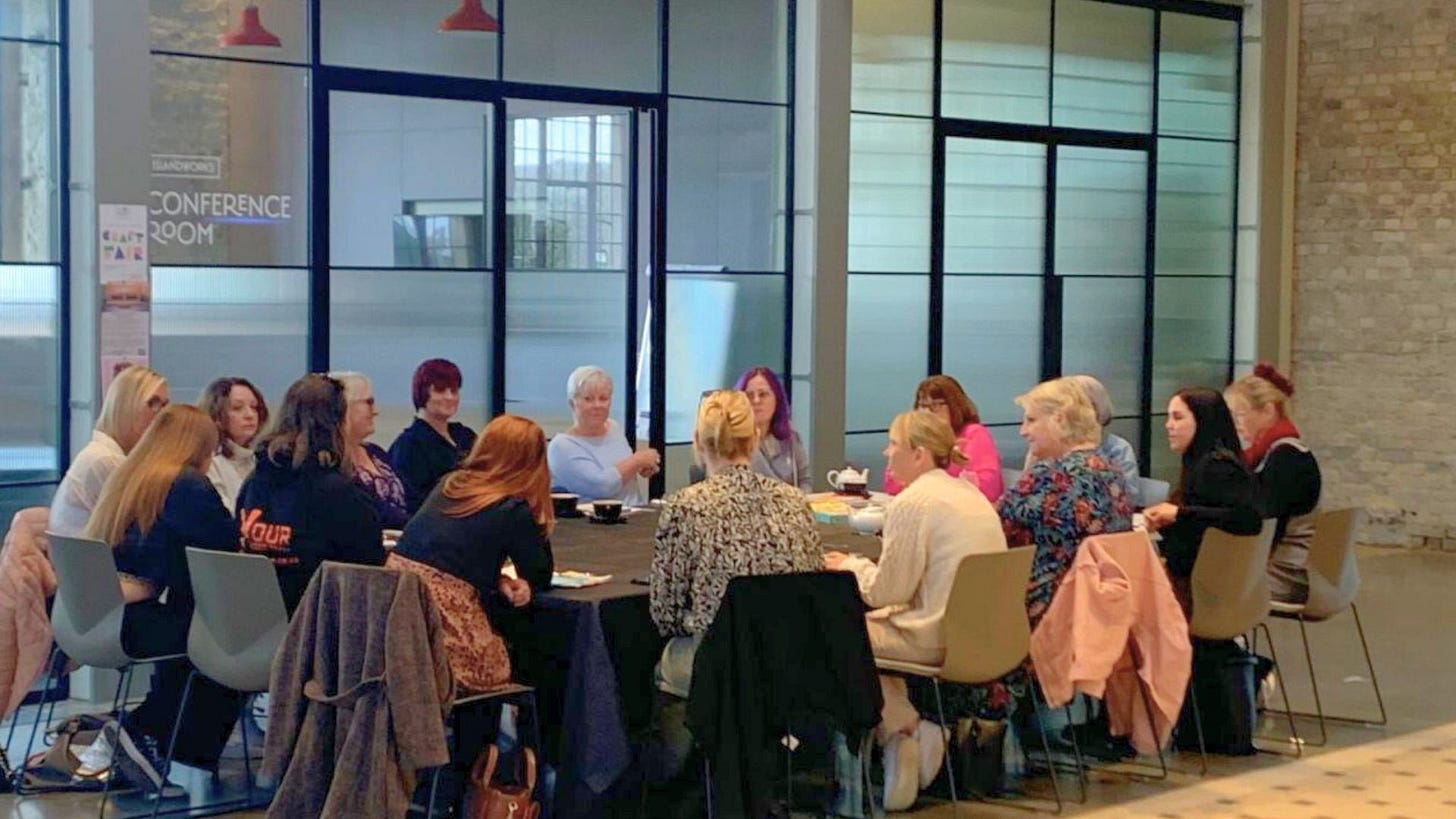"Apparently, Working from Home Isn’t Proper Work" Don't Get Me Started!
The 'truth' according the the Stuart Rose report. Practical Solutions and lessons from Ladies Who Latte networking.
Disclaimer: This post may have…
Spelling and grammar mistakes
AI generated text (the boring factual bits that are just too boring to write)Swearing (not sure, let’s see how it pans out)
Affiliate Links
Made up words
Wobbly Facts
On Wednesday, I had the privilege of speaking with the BBC about Stepping Out. This is our new Kent, UK, based programme designed to help businesses connect, collaborate, and work on their targets in a focused environment away from the distractions of home or office.
The interview tied in with Stuart Rose's recent report on working from home, which claimed it had set the UK economy back by 20 years. His report highlighted concerns about productivity, mental health, and the challenges faced by young people entering the workforce.
While some of his points were valid, I don’t see this as a binary “good vs bad” debate. One controversial comment suggested that working from home isn’t “proper work.”
I’ve left this space clear so you can feel my fume 🤬 about sweeping statements and hidden agendas
This sparked a discussion at Ladies Who Latte in Sheppey, where we explored how to strike a balance—making our time both productive and fulfilling while growing our businesses.
Here’s what we thought:
Key Challenges and Solutions
1. Distractions and Interruptions (people, animals, washing machines!)
Create a dedicated space: Even a small, well-defined area can help you focus.
Schedule distraction time: Allow 20 minutes after every hour of work to deal proactively with potential interruptions or deal with any issues arising.
Hybrid solutions: Muckash Sharma was also interviewed by the BBC as the creator of Ascend, the new co-working and office space in Medway, ideal for hybrid working. We recently experienced working as a group in this inspirational space which offers the focus of an office without the cost or commitment.
Think small: If carving out focus time alongside family and other pressures is difficult, try just 15-minute blocks.
2. Stagnation and Procrastination
Change your scenery: A coffee shop or a new location can energise your mind for new ideas. Also try different types of spaces, high ceilings can spark new and abstract ideas.
Reward yourself: Treat yourself after tackling difficult or boring tasks.
Network and connect: Meeting others can spark new ideas and break the monotony.
3. Isolation and Introspection
Without feedback it can be difficult to assess if we’re doing a good job. Clients can often focus on what’s gone wrong, and without regular appraisals as we usually get in employment it can be tricky to know how we’re doing. As our brains have a tendency to steer towards the negative, that’s often where we can end up.
Plus, it can seem as though everyone else is doing a fabulous job growing their business when the only views we have are from social media.
Build a peer network: Collaborate with trusted peers for support and fresh perspectives. Think of people in the same industry as your support network instead of your competition.
Stay connected: If employed, ensure regular contact with colleagues to exchange ideas.
4. Overworking (The day never ends!)
We agreed that far from being lazy, home workers often struggle to stop working. Here are some tactics we shared:
Keep your to-do list tight: Use a DAILY to-do list and focus on just that day’s priorities.
Time block: Schedule your day with clear start and finish times.
Respect boundaries: Train clients and colleagues to respect your working hours. You may be happy to accept messages after hours, but scheduling your response times to be within your core hours shows clients and colleagues that you aren’t available 24/7; that you respect your down time, and expect them to do the same.
Take real breaks: Step away from your workspace for meals and walks.
Close the office: Shut a door, cover your desk with a cloth or the cat.
5. Increased Costs: Heating and lighting costs can add up when working from home. Some members recommended exploring deals with providers like Octopus or Utility Warehouse, which have ranked highly in recent reports.
So, What Did I Do? That night, I took a leaf out of our own discussion!
As a magazine publisher and event organiser, my workspace is often cluttered with display materials, paper, inks, really all sorts, shapes and sizes of stuff which really will be needed at some point. It makes me feel messy and scattered having all this in my view. So, I shifted my desk to a smaller, more defined area that I can keep clear, helping me stay productive. It made it much trickier to just pop stuff on my desk instead of sorting it out. Also, as I am now in a corner I gaze at inspiring picture on my wall instead of mounds of boxes with things spilling out of them.
We’ll be following up on these ideas at the next meeting of Ladies Who Latte on 28th February in Sheppey and at Stepping Out on 14th February in Medway.
A huge thank you to everyone who contributed to these discussions!
Apologies that there’s no photo from yesterday (I may have been slightly distracted by a sausage sandwich!). Luckily, someone else snapped one, and it’s on its way to me. I’d love to hear your thoughts—what challenges have you faced while working from home, and what strategies have worked for you? Drop your ideas in the comments!
Ladies Who Latte is free, fun and foodie (super sandwiches for all diets). We meet in the IslandWorks cafe in Sheerness on the 4th Friday of every month. No need to book, you can just turn up.
You can get updates on Ladies Who Latte here https://subscribepage.io/LWL-Updates
Visit http://steppingout.club for more about Stepping Out



